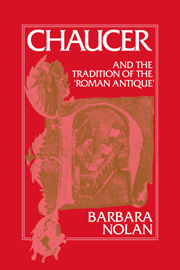Book contents
- Frontmatter
- Contents
- Acknowledgments
- List of abbreviations
- Introduction
- 1 Benoît de Sainte-Maure's Roman de Troie and the compositional practices of the roman antique
- 2 Plaits, debates, and judgments in the Roman de Thèbes, the Roman de Troie and the Roman d'Eneas
- 3 The poetics of fine amor in the French romans antiques
- 4 From history into fiction: Boccaccio's Filostrato and the question of foolish love
- 5 Boccaccio's Teseida and the triumph of Aristotelian virtue
- 6 Saving the poetry: authors, translators, texts, and readers in Chaucer's Book of Troilus and Criseyde
- 7 The consolation of Stoic virtue: Chaucer's Knight's Tale and the tradition of the roman antique
- Epilogue
- Notes
- Bibliography
- Index
2 - Plaits, debates, and judgments in the Roman de Thèbes, the Roman de Troie and the Roman d'Eneas
Published online by Cambridge University Press: 11 September 2009
- Frontmatter
- Contents
- Acknowledgments
- List of abbreviations
- Introduction
- 1 Benoît de Sainte-Maure's Roman de Troie and the compositional practices of the roman antique
- 2 Plaits, debates, and judgments in the Roman de Thèbes, the Roman de Troie and the Roman d'Eneas
- 3 The poetics of fine amor in the French romans antiques
- 4 From history into fiction: Boccaccio's Filostrato and the question of foolish love
- 5 Boccaccio's Teseida and the triumph of Aristotelian virtue
- 6 Saving the poetry: authors, translators, texts, and readers in Chaucer's Book of Troilus and Criseyde
- 7 The consolation of Stoic virtue: Chaucer's Knight's Tale and the tradition of the roman antique
- Epilogue
- Notes
- Bibliography
- Index
Summary
In the Roman de Thèbes, in a delicate moral situation involving an accusation of political treachery, Othon, one of King Eteocles' vassals, directs his lord to “have the judgment first and then act accordingly.” The judgment Othon demands of Eteocles points tellingly to one of the most distinctive formal features of the twelfth-century romans antiques. In this chapter I examine ways in which both vernacular epic and classical academic forms of debate, questioning, and jugement help to shape the Roman de Thèbes, the Roman de Troie, and the Roman d'Eneas. These forms – inherited equally from the judicial trials or plaits of earlier vernacular literature (and life), the oratory of Latin epic, and medieval school practices of rhetorical disputation – enter more or less centrally into the making of all three of the twelfth-century French romans antiques. Ingeniously sidestepping matters of Christian doctrine by translating ancient secular matter, the clerkly romanciers used dramatized debate and argumentation to pose circumstantial moral questions of crucial interest to their lay aristocratic public. The issues they raised had to do not with religious belief but rather with possible or hypothetical systems of ethical conduct and value put to the test in the context of an uncertain world without the benefit of Christian revelation.
Signs of a twelfth-century academic interest in ancient modes of ethical argumentation appear in a manuscript of great importance for the history of medieval romance – the codex containing the only extant remnant of Alberic of Pisançon's Alexandre?
- Type
- Chapter
- Information
- Chaucer and the Tradition of the Roman Antique , pp. 48 - 74Publisher: Cambridge University PressPrint publication year: 1992

